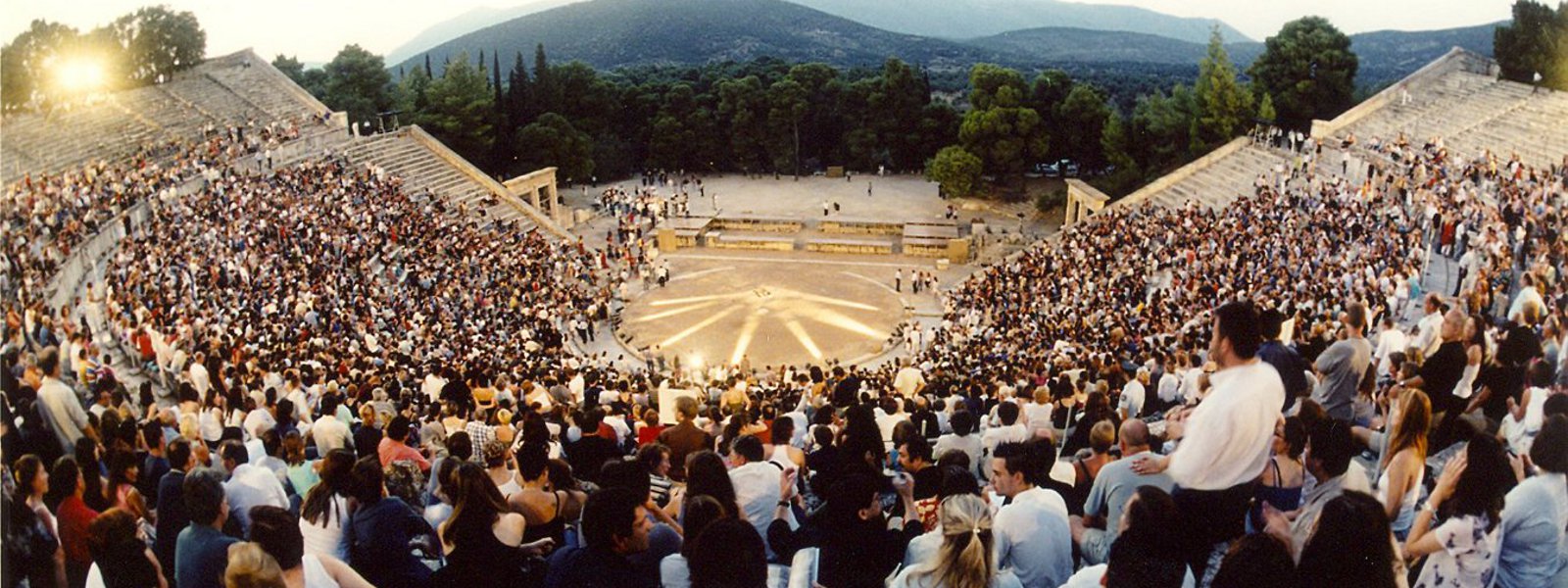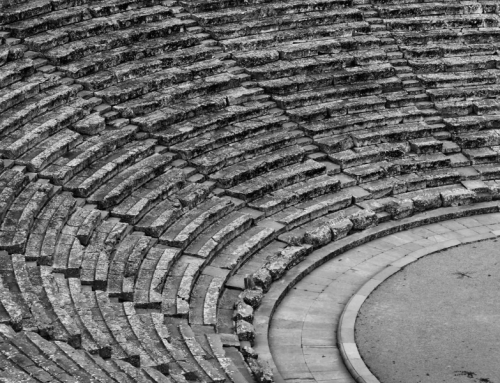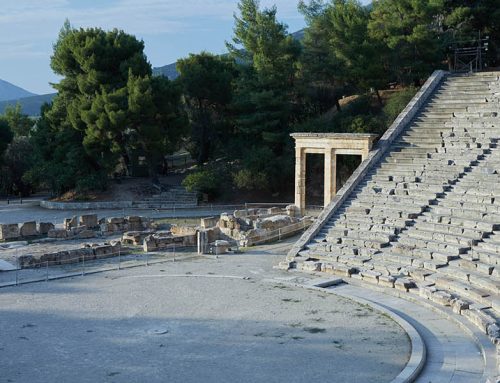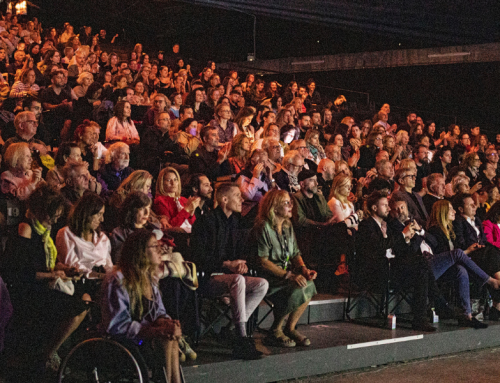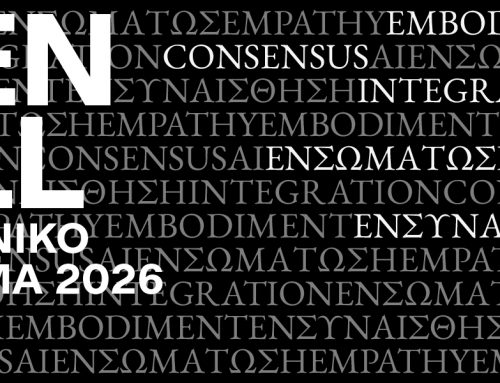Epidaurus Festival 2018
Ancient Theatre of Epidaurus
29 & 30 June
The Acharnians by Aristophanes
Direction – Adaptation: Kostas Tsianos
Choreography: Elena Gerodimou, Kostas Tsianos
Set and costume design: Yannis Metzikov
Music: George Andreou
Musical coaching: Panagiotis Tsevas
Assistant to the director: Loukia Stergiou
Artwork – Programme design: Karolos Porfyris
Photos: Ioanna Chatziandreou
Cast: Petros Filippidis, Pavlos Haikalis, Kostas Koklas, Ioannis Papazisis, Takis Papamathaiou
Chorus: Nikos Vatikiotis, Alexandros Zouganelis, Panagiotis Kammenos, Panagiotis Katsolis, Konstantinos Korakis, Vangelis Kyparissis, Iraklis Kostakis, Alkiviadis Maggonas, Pavlos Pavlidis, Marios Petkidis, Grigoris Stamoulis, Giorgos Tsourounakis, Charis Fleouras, Charis Chiotis
Production: THEAMA MARTA
Director’s note:
The Acharnians was first presented at the Lenaia festival, in the sixth year of the Peloponnesian War (425 B.C.), earning the then-19-year-old Aristophanes the first prize. In this play, Aristophanes sets out to ridicule war and warmongers, expressing people’s longing for peace. The comedy is set in rural Attica, in Acharnae (modern-day Menidi).
Aristophanes is fully aware that the genre of comedy hails from religious ceremonies of fertility. Throughout The Acharnians there are many references to Dionysus. In one memorable scene, Dikaiopolis and his family perform a phallic procession and sing a phallic song. There are also excellent comical scenes, typical of the Megara farces. The lively chorus of the old coal-miners of Menidi transforms this wonderful comedy into a frantic Dionysian feast. Our performance will draw on popular tradition, echoing the Dionysian spirit so prominent in Aristophanes’ The Acharnians.
Kostas Tsianos
6 & 7 July
Agamemnon by Aeschylus
Translation: Yorgos Blanas
Direction: Cezaris Graužinis
Set and costume design: Kenny MacLellan
Music – Musical coaching: Haris Pegiazis
Movement: Eddie Lame
Lighting design: Alekos Yiannaros
Assistant director: Sygklitiki Vlahaki
Dramaturgy consultant: Panagiotis Skouras
Cast: Maria Protopappa, Yannis Stankoglou, Argyris Pantazaras, Iovi Fragatou, and Thodoris Katsafados
Chorus: Markos Gettos, Dimitris Georgiadis, Tasos Theofilatos, Panagos Ioakeim, Dimitris Karaviotis, Elias Menayer, Dimitris Miliotis, Alexandros Moukanos, Alexandros Balamotis, Vasilis Papageorgiou, Clearchos Papageorgiou, Giorgos Papandreou
Production manager: Anastasia Kavalari
Communication: Anzelika Kapsampeli
Artistic direction of Stefi Productions: Aliki Danezi Knutsen
Promo photos: Tasos Thomoglou
Trailer: Patroklos Skafidas
Production: Athens & Epidaurus Festival – Stefi & Lynx Productions / Arcadia Media – Regional and Municipal Theatre of Kozani – Regional and Municipal Theatre of Veroia
Director’s note:
In Aeschylus’ Agamemnon, the tragic characters are doomed to suffer and die, whereas the members of the Chorus are doomed to suffer and live, revisiting their misfortunes and seeking a way out. In a Polis doomed to self-destruction, citizens, here represented by the Chorus, must muster their strength and faith, and redefine their moral and civic values, thus ensuring their continued survival.
This tragedy addresses the crucial need for reawakening citizens’ sense of duty. Conflict is built upon these grounds: even obedient citizens will inevitably find themselves at odds with the status quo.
Cezaris Graužinis
13 & 14 July
National Theatre of Greece
Plutus by Aristophanes
Adaptation – Direction: Nikita Milivojević
Assistant to the director – Translation into Greek: Ismini Radulović
Text adaptation – Original lyrics: Giannis Asteris
Set design: Kenny McLellan
Costume design: Marina Medenica
Music composer: Alekos Anastasiou
Choreography: Amalia Bennett
Cast: Giorgos Gallos (Chremylus), Stelios Iakovidis (Cario), Vassilis Charalampopoulos (Plutus), Manos Vakousis (Blepsidimus), Galini Chatzipaschali (Poverty), Giannis Kotsifas (Asclepius / Chorus), Kostas Koronaios (Chremylus’ wife / A just man / Chorus), Michalis Titopoulos (Sycophant / Hermes / Chorus), Maria Diakopanagiotou (Woman / Chorus), & chorus of musicians from the Orchestra of the National Theatre in Belgrade
Sponsored by Hellenic Petroleum
Director’s note:
From Aristophanes’ time to our own, Plutus (Greek for “wealth”) is invariably the most powerful deity on the face of the earth; the driving force behind everything. Today’s inequality in wealth distribution is striking: the 100 richest people on the planet have accumulated more wealth than half the world’s population. Whether Wealth is blind or has the gift of sight is completely irrelevant: what matters is that the rich get richer and the poor get poorer.
Nikita Milivojević
20 & 21 July
National Theatre of Greece
Electra by Sophocles
Translation: Giorgos Chimonas
Direction: Thanos Papakonstantinou
Set and costume design: Niki Psychogiou
Lighting design: Christina Thanasoula
Music: Dimitris Skyllas
Choreography: Chara Kotsali
First assistant to the director: Marios Panagiotou
Second assistant to the director: Vasilis Vilaras
Cast: Alexia Kaltsiki (Electra), Maria Nafpliotou (Clytemnestra), Alexandros Mavropoulos (Orestes), Christos Loulis (Aegisthus), Eleni Moleski (Chrysothemis), Marios Panagiotou (Pylades), Nikos Chatzopoulos (Tutor), Chorus: Asimina Anastasopoulou, Sofia Antoniou, Ioanna Demertzidou, Nadia Katsoura, Eleni Koutsioumpa, Kleopatra Markou, Maria Mina, Ioanna Michala, Tzortzina Palaitheodorou, Nancy Sideri, Kalliopi Simou, Danae Tikou
Sponsored by Athens International Airport
Director’s note:
Written in the shadow of the Peloponnesian War, Electra is one of Sophocles’ most brutal plays. From the very first scene, the return of matricide Orestes, to the final scene with the victorious battle-cries of the chorus, the entire play is structured as an interplay of light and darkness; a battle of contradictions built around a trial, a violated balance and the need to redress that balance. Sophocles invites us to watch the workings of the natural world – the law of retaliation – through the lens of civil conflict.
Sophocles is not interested in the morality of the issue at hand. Whether balance will be restored in a peaceful or violent manner is irrelevant. Violence pervades human relationships. Violence breeds violence: wrongdoing invites retaliation. The fact that revenge here, in the form of matricide, goes far beyond what is normally expected in a so-called civilized society is also irrelevant. Sophocles’ Electra calls for retribution rather than justice.
Thanos Papakonstantinou
27 & 28 July
Thesmophoriazusae by Aristophanes
Translation: Pantelis Boukalas
Direction: Vangelis Theodoropoulos
Music: Nikos Kypourgos
Costume design: Angelos Mentis
Set design: Magdalini Avgerinou
Choreography: Cecil Mikroutsikou
Lighting design: Sakis Birbilis
Assistant director: Pantelis Dentakis
Assistant to the set designer: Gina Iliopoulou
Assistant to the costume designer: Semina Lantavou
Music coaching: Anastasis Sarakatsanos
Cast: Makis Papadimitriou (Mnesilochus), Odysseas Papaspiliopoulos (Euripides), Giorgos Chrysostomou (Agathon, Bowman), Nantia Kontogeorgi (Micca), Eleni Ouzounidou (Herald), Andri Theodotou (Critylla), Maria Katsandri (Philista), Giorgos Papageorgiou (Agathon’s servant, Cleisthenes)
Chorus of Thesmophoriazusae: Valeria Dimitriadou, Irene Makri, Katerina Maoutsou, Irida Mara, Fragiski Moustaki, Eleni Boukli, Ilektra Sarri, Natasa Sfendylaki, Antigoni Fryda
Musicians: Anastasis Sarakatsanos, Sofia Kakoulidou, Giota Panagi
Co-production: Α. Μ. Techni Choros – Municipal and Regional Theatre of Crete – Municipal and Regional Theatre of Ioannina – Athens & Epidaurus Festival
Director’s note:
In Thesmophoriazusae, one of Aristophanes’ three “women” plays, written in 411 B.C., at a time when Democracy was overthrown and replaced by Oligarchy, women call for political stability. Nowadays, women are no longer in the same difficult position. They are no longer restricted to imagining a political future without having the right to participate in the Polis. However, there are still plenty of minorities with no access to the workings of the Polis. A play about gender issues, the quest of personal identity, the right to equal civil rights, the crisis in values, law and nature. Above all, a play bursting with humour and theatricality, enabling actors to be fully present on stage as political entities.
Vangelis Theodoropoulos
3 & 4 August
National Theatre of Northern Greece
Orestes by Euripides
Translation: Yorgos Blanas
Direction: Yannis Anastasakis
Set and costume design: Yannis Thavoris
Music: Babis Papadopoulos
Movement: Alexis Tsiamoglou
Lighting design: Lefteris Pavlopoulos
Musical coaching: Nikos Voudouris
Assistant director: Samson Fytros|
Assistant to the set designer: Elina Eftaxia
Photos: Tasos Thomoglou
Production manager: Marleen Verschuuren
Cast: Ioanna Kolliopoulou (Electra), Dafni Lamprogianni (Helen), Nikolas Maragopoulos (Messenger), Dimitris Morfakidis (Pylades), Dimosthenis Papadopoulos (Apollo), Marianna Pourega (Hermione), Kostas Santas (Tyndareus), Christos Stergioglou (Trojan), Christodoulos Stylianou (Menelaus), Christos Stylianou (Orestes)
Chorus: Eleftheria Aggelitsa, Momo Vlachou, Stellina Vogiatzi, Anastasia Exintaveloni, Pavlina Zachra, Maria Konstanta, Christina Papatriantafyllou, Maria Petevi, Elina Rizou, Evi Sarmi, Christina Christodoulou, Styliani Psaroudaki
Director’s note:
To what extent can a society caught up in a vicious cycle of crime find a way out? Three young people, Orestes, Electra, and Pylades are entangled in a spiral of blood and violence. Gods and humans have spun an intricate web of hatred and vengeance. Sibling love turns into complicity; friends become partners in crime; the people’s verdict leads to capital punishment. No end in sight for this war. The city will burn.
Euripides’s tragedy lays bare the human soul. When everything terrible is said and done, only the deus ex machina remains, coming, as usual, without warning. Problem is, nobody believes in god’s fairy tales anymore.
Yannis Anastasakis
10 & 11 August
The Frogs by Aristophanes
Translation: Yorgos Blanas
Direction: Kostas Filippoglou
Assistant director: Giota Seremeti
Assistant to the director: Silia Koi
Set & costume design: Telis Karananos, Alexandra Siafkou
Movement: Sofia Paschou
Music: Nikos Galenianos
Lighting design: Nikos Vlasopoulos
Photos: Panos Giannakopoulos
Communication: Daisy Lembesi
Cast in order of apparance: Lakis Lazopoulos, Sofia Filippidou, Dimitris Piatas and Antonis Kafetzopoulos
Also starring: Anna Kalaitzidou, Giannis Stefopoulos, Giorgos Symeonidis, Erifili Stefanidou, Tasos Dimitropoulos, Giannis Giannoulis, Dimitris Drosos, Irini Boundali, Foivos Symeonidis, Crhistos Kontogeorgis, Alexandros Chrysanthopoulos
Musicians – performers: Stamatis Pasopoulos, Christoph Blum
The entire cast takes part in the Chorus
Director’s note:
In The Frogs, Aristophanes attempts a phantasmagorical nekyia, a descent to the underworld. Much like Odysseus, Aristophanes seeks a path to his utopian Ithaca. One can only fulfil one’s life by discovering the true meaning of death. The Polis must come to terms with its own lack in order to gain a more substantial presence. The Polis needs to plunge deep into Hades to regain its lost identity.
Disguised as Hercules, Dionysus descends to the underworld to bring Euripides back among the living, since Athens no longer boasts a great poet. Even though this journey unfolds in the twilight of the dead, it is presented as a cheerful and entertaining guided tour, almost as if it were a medieval carnival.
Dionysus does not descend among the dead to bring back a great politician, a worthy philosopher, or general. Instead, he chooses to bring back a dramatic poet. Evidently, Aristophanes considers poetry and drama as the only powers capable of saving the Polis from its decline: a truly curious perspective, by contemporary standards.
This carnivalesque underworld, as depicted by Aristophanes, is healthy when compared to the diseased world of the seemingly “serious” living people. Comedy, with all its hilarious episodes, becomes a political tool, still relevant to our times.
The Frogs stand in for humanity itself. Humans are like amphibians, foreign both in land and sea, yet also feeling everywhere at home, ready to sing and dance. The carnival symbolizes humanity’s struggle to go beyond themselves, to conquer a distinct identity. This identity is not expressed in the dramas by the “realist” Euripides; it is expressed in the dramas written by the epic storyteller Aeschylus, this serious, imposing poet. Aeschylus constantly dismisses his opponent with the expression “lekythion apolesen,” that is, “he lost his little oil flash,” an expression which is commonly held to be a joke about Euripides’ sexual impotence.
The world of the living slowly dies away, due to their inability to create new respectable myths, no matter how outrageous these myths may be. Conversely, the underworld bursts with life, because its inhabitants retain the power of imagination and are capable of taking a distance from themselves, while still having a flair for games.
Kostas Filippoglou
17 & 18 August
Oedipus at Colonus by Sophocles
Athens & Epidaurus Festival, in collaboration with INDA (Instituto Nazionale del Dramma Antico)
Direction – Set design: Yannis Kokkos
Translation into Italian: Federico Condello
Collaborating director: Alfio Scuderi
Artistic assistant: Annick Blancard
Assistant director: Stephan Grögler
Music: Alexandros Markeas
Costume design: Paola Mariani
Lighting design: Giuseppe Di Iorio
Cast: Massimo De Francovich (Oedipus), Sebastiano Lo Monaco (Theseus), Roberta Caronia (Antigone), Stefano Santospago (Creon), Fabrizio Falco (Polynices), Eleonora De Luca (Ismene), Danilo Nigrelli (Messenger), Sergio Mancinelli (Stranger), Davide Sbrogiò (Coryphaeus)
Chorus of Elders: Massimo Cimaglia, Francesco Di Lorenzo , Lorenzo Falletti, Eugenio Santovito, Carlo Vitiello, La Vecchia Tatu
Chorus of Youths: Tommaso Garrè, Salvatore Ventura, Emanuele Carlino, Federico Mosca, Danilo Carciolo
Chorus of Soldiers: Alessandro Accardi, Mauro Cappello, Antonino Cicero Santaelena, Alessandro di Feliciantonio, Giacomo Lisoni, Andrea Maiorca, Riccardo Rizzo, William Caruso, Roberto Mulia, Salvatore Pappalardo, Stefano Pavone
Chorus of Women: Guilia Oliva, Chiara Ciancola, Vittoria Scuderi, Maria Chiara Pellitteri, Miriam Scala, Greta D’ Antonio, Noemi Scaffidi, Silvia Trigona, Guilia Messina, Silvia Messina, Federica Gurrieri, Adele di Bella, Alba Sofia Vella, Guilia Antille, Gabriella Zito
Appearing as older women: Lucia Imprescia, Lisi Giusi
Athens & Epidaurus Festival & Fondazione Inda Production
Supported by Michael Cacoyannis Foundation
The performance is set to be presented at the 54° Festival al Teatro Greco di Siracusa (8 May – 8 July) in Syracuse and subsequently at the Ancient Theatre of Epidaurus.
Director’s note:
Sophocles’ final tragedy is at once a meditation on human fate and a tribute to his favourite city, Athens.
Burdened by horrific crimes and haunted by his city, Thebes, the elderly Oedipus arrives at Colonus, almost as if he were a migrant, choosing this area as his final resting place.
Oedipus has been sentenced by the gods, led by them to Colonus, the place of his redemption.
Previously the agos of the polis, Oedipus re-emerges as a hero at Colonus. Its people receive him, both for moral reasons and for reasons of interest.
A tragedy about physical and metaphysical borders, about the mystery of human freedom in the face of gods’ omnipotence, about responsibility, about old age, about the political rule of the Polis. Oedipus at Colonus is an intimate poem, a spiritual journey.
From Syracuse to Epidaurus, our tragedy will carry Oedipus all the way to the sacred forest of the Furies, to his final apotheosis.
Yannis Kokkos
A Note from the Artistic Director of Festival al Teatro Greco di Siracusa:
In 2018, the Instituto Nazionale del Dramma Antico will invite audiences to Syracuse for three plays debating the issue of power and addressing the complex and shifting role of the hero and the tyrant in the ancient world, both in their heightened representation in tragedy, as well as in their representation through farce and ridicule. These plays are: Oedipus at Colonus by Sophocles, Herakles by Euripides, and The Knights by Aristophanes.
Oedipus at Colonus is a tragedy about old age, recounting the story of an old man, Oedipus. Having previously wandered around as a scapegoat (Oedipus Rex), Oedipus retires to Colonus, becoming the area’s genius loci. Sophocles’ final tragedy is nothing less than a spiritual testament, evoking the image of an entire population of people on the brink of disaster. The play is a meditation on the great themes of humanity: the mystery of existence and death; the conflict between political and religious morality; the relationship between the objectivity of guilt and the subjectivity of punishment; the inexorability of a destiny determined by omnipotent forces; the fragility of reason and human justice. Athena represents eternal values, such as hospitality towards supplicants, opposition to the arrogant, respect of the law, the worship of the gods. The tragedy comes to an end with the final redemption of a man who was first humiliated and then elevated to the rank of hero. Sophocles delivers verses of extreme purity, exemplified by the sublime poetry of the chorus celebrating “the best dwelling on earth, candid Colonus.”
It is a great honour for us to present Oedipus at Colonus, directed by Greek cosmopolitan artist and intellectual Yannis Kokkos. More importantly, this performance will be held at the Ancient Theatre of Epidaurus, kicking off a precious and significant collaboration, built upon a geography of the soul, as evidenced in the sublime energy of the two ancient theatres in Sicily and Epidaurus.
As a great contemporary writer has said: the essential mandate of a civilization that takes its future to heart is to guard and bequeath Beauty.
Roberto Andò
Little Theatre of Ancient Epidaurus
6 & 7 July
VASISTAS
The Libation Bearers by Aeschylus
Direction: Argyro Chioti
Translation: Thanasis Valtinos
Dramaturgy: VASISTAS, Efthymis Theou
Lighting design: Tasos Palaioroutas
Music: Jan Van de Engel
Costume design: Iro Vagioti, with Matina Megla
Assistant director: Gely Kalampaka
Artistic collaborator: Ariane Labed
Set design: Eva Manidaki
Construction of musical instruments: Antonis Chatziperoglou
Dramaturgy consultant: Nikos A. Panagiotopoulos
Cast: Evi Saoulidou, Evdoxia Androulidaki, Aeneias Tsamatis, Antonis Antonopoulos, Fidel Talampoukas, Matina Pergioudaki, Yannis Klinis, Georgina Chryskioti, Eleni Vergeti, Dimitris Kontos, Argyro Chioti
Co-production: Athens & Epidaurus Festival – Municipal and Regional Theatre of Kavala – Philippi Festival
Supported by Municipality of Moschato & Tavros
Director’s note:
“Am I shouting to the deaf and fruitlessly wasting my voice on people who are asleep?”
The greatest mourning song of ancient Greek literature. A premeditated crime set up on stage, with the complicity of the audience. The VASISTAS group approaches the play as a profound conflict between human instincts and social conformity, focusing on the chorus, this powerful voice that is constantly on stage, pushing things forward and inciting to murder. The chorus is a massive voice watching, directing, and ultimately holding power over everything. The chorus is the social mandate that occasionally wrests control and defines the course of history. The two main characters of the play, Orestes and Electra, are like two puppets with barely any right to make choices for themselves. They are weighed down by the burden of the past, forced to follow it all the way, making a seemingly impossible choice. Their future is inextricably bound with the act of murder.
Argyro Chioti
20 & 21 July
Antigone by Sophocles
Translation – Dramaturgy: Nikos A. Panagiotopoulos
Direction: Konstantinos Ntellas
Set design: Andreas Skourtis
Costume design: Konstantina Mardiki
Original music: Alexandros Ktistakis
Lighting design: Panagiotis Lampis
Assistant to the set designer: Vivianna Chiotini
Assistant director – Movement: Androniki Marathaki
Communication: Maria Konstantopoulou
Cast: Efthimis Chalkidis, Thanasis Dovris, Konstantinos Ntellas, Fani Panagiotidou, Maria Parasyri, Despoina Dorina Remediaki
Production Design: Konstantinos Sakkas
Production Manager-Coordinator: Maria Vasariotou
Line production: Ioanna Venetaki
Production Management: Delta Pi
Participants: Students and graduates of Ptolemaida’s Music School: Christodoulos Anagnostopoulos, Stylianos Vlachodimos, Dimitris Mentesidis, Christos Zgouros. Students of Ligourio High School, Epidaurus Municipality. Members of KAPI, Epidaurus Municipality.
The following students of the Athens School of Fine Arts helped in preparing and constructing the sets: Konstantinos Valioutis, Marina Markouli, Lydia Maria Xyggi.
The performance is realized with the support of Athens Culture Net (founding donor: Stavros Niarchos Foundation) and Athens Digital Lab of the City of Athens, with exclusive donation from Stavrios Niarchos Foundation through Athens Partnership, a collaboration of COSMOTE, NOKIA and Stavros Niarchos Foundation.
Rehearsals were held at the Serafio Sports, Culture and Innovation Centre of the City of Athens
Director’s note:
Eteocles fell in battle, defending his city. He is a hero.
Eteocles usurped the throne that was rightfully his brother’s.
Polynices died while fighting against his own homeland. He is a traitor.
Polynices claimed the throne that was rightfully his.
Who is right? Who is wrong?
Creon is responsible for the Polis. There is a blind spot in the Polis.
Creon faithfully does what is, by his own declaration, necessary for the restoration of peace and order.
Antigone is responsible for her family and its dead.
Antigone violates the laws of the Polis, causing mayhem and disorder.
Who is right? Who is wrong?
Athens prohibits proper burial of the sacrilegious, the traitors, and the suicides.
From just lord and keeper of the law, Creon becomes an obsessive tyrant; his stance precipitates three suicides.
Antigone buries her brother, thus doing what is usually reserved for men.
Creon mourns his son’s dead body, thus doing what is usually reserved for women.
Which one of the two is the tragic character?
Konstantinos Ntellas
3 & 4 August
Prometheus Bound by Aeschylus
Translation: Nikoletta Frintzila
Direction: Martha Frintzila
Set design – Music: Vassilis Mantzoukis
Lighting design: Felice Ross
Costume design: Ilianna Skoulaki, Baumstrasse team
Props – Masks: Camilo Bentancor, Baumstrasse team
Movement: Emmanuela Korki
Assistant directors: Michalis Panadis, Theano Metaxa, George Vourdamis-Mavrogenis, Vassia Bala
Production manager: Ioanna Nasiopoulou
Scientific associate: Iossif Vivilakis
Cast: Nikos Karathanos (Prometheus), Kora Karvouni (Io), George Vourdamis-Mavrogenis (Cratus & Bia), Kostas Vasardanis (Hephaestus, Hermes), Michalis Panadis (Oceanus)
Chorus of Oceanids: Fonέs (coached by Marina Satti): Evgenia Liakou, Erasmia Markidi, Elena Papadimitirou, Eleni Pozatzidou, Virginia Frangoulatzi, Maria Nika
Musicians: Vassilis Mantzoukis, Panagiotis Manouilidis
Director’s note:
In this performance we will focus on the power of language and spoken words, reciting the text in a rhythmical and melodious manner. We have decided to refrain from an expressive dramatic performance, instead making discourse central, insisting on a clear recitation of the words and their meaning. Of course, this approach does not entail that performers will lack theatricality and passion. The use of masks and carefully planned movement will infuse our performance with theatricality. The production will adopt a very strict motif of music and movement, allowing performers to express themselves inside a very tightly constructed aesthetic universe.
Martha Frintzila
Ancient Stadium of Epidaurus
14 & 15 July
The Eumenides by Aeschylus (ORESTEIA cycle)
Translation: Dimitris Dimitriadis
Concept – Performance: Stefania Goulioti
Musical dramaturgy – Performance: Dimitris Kamarotos
Artistic collaboration: Sylvia Liouliou – Giorgos Kritharas
Set design: Eva Manidaki
Costume design: Angelos Mentis
Alexander technique: Vicky Panagiotaki
Assistant to the set designer: Evgenia Makroglou
Photos: Aris Kamarotos
Executive producers: POLYPLANITY Productions / Yolanda Markopoulou & Vicky Strataki
Director’s note:
“Allow fear to inhabit the polis.”
Our project meets a very specific need: to delve into the depths of the human soul, exposing dreams, insecurities, and fears before a live audience; an attempt to bring together the Conscious and the Unconscious. The Furies appear as scaremongers, whispering their desires and disputes; it is then that humans come to the realization that they themselves are these very voices. These voices are contained in all the tragic heroes.
Our performance will be a challenge, a trial as far as acting is concerned, exposing, not just the visual aesthetics, but also the ideal condition wherein the audience can see what the actor imagines rather than what is merely presented on the stage. A difficult endeavour: when achieved, audience and performers connect amidst an invisible landscape, sharing a powerful experience.
Stefania Goulioti



